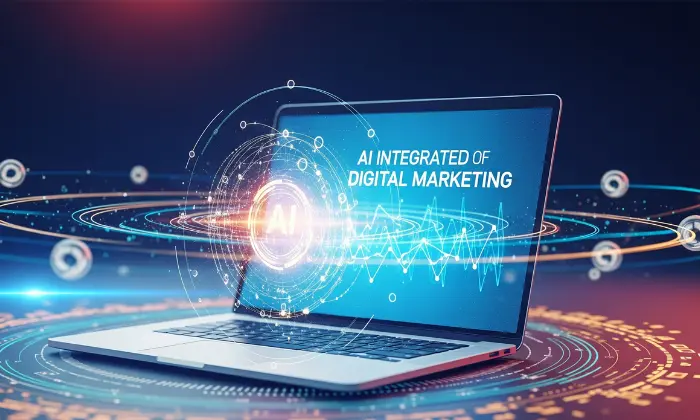What is AI?
Artificial Intelligence, or AI, refers to the simulation of human intelligence in machines that are programmed to think, learn, and make decisions. These systems can analyze data, recognize patterns, and perform tasks with little or no human input. AI includes a wide range of technologies such as machine learning, natural language processing, and computer vision.
AI is already deeply embedded in our daily lives — from voice assistants like Siri and Alexa to recommendation engines on Netflix and Amazon. But in the field of marketing, its impact is even more profound and rapidly evolving.
Why is AI Important in Digital Marketing?
The core of digital marketing is data — understanding customer behavior, predicting trends, optimizing campaigns, and improving engagement. AI excels at handling large volumes of data faster and more accurately than humans.
With AI, marketers can automate repetitive tasks, personalize user experiences, and make data-driven decisions in real time. It allows businesses of all sizes to scale their marketing strategies without increasing costs proportionally.
Benefits of Using AI in Digital Marketing
1. Automation of Repetitive Tasks
AI tools can automate email marketing, ad targeting, content recommendations, and even social media scheduling. This frees up time for marketers to focus on strategy and creativity.
2. Personalization at Scale
AI can analyze user behavior and create highly personalized content for each visitor — from product recommendations to dynamic emails and web pages. Personalization improves conversion rates and customer loyalty.
3. Data Analysis and Insights
AI algorithms can process massive datasets to uncover insights that would take humans days or weeks. This enables better targeting, improved ROI, and faster decision-making.
4. Improved Customer Support
AI-powered chatbots and virtual assistants provide instant responses to customer queries 24/7, improving user experience and reducing support costs.
5. Predictive Analytics
AI can predict future behavior based on past actions, such as forecasting sales, customer churn, or the best time to send emails.
Key Applications of AI in Digital Marketing
1. Chatbots and Conversational AI
AI-powered chatbots simulate human conversation and can handle customer queries, guide users through sales funnels, and even complete transactions. Tools like Drift, Intercom, and Zendesk use conversational AI to improve customer service and engagement.
2. Email Marketing Automation
Platforms like Mailchimp and ActiveCampaign use AI to analyze subscriber behavior and automatically send personalized emails at the right time with the right content.
3. Content Creation and Curation
AI tools such as ChatGPT and Jasper help marketers write blogs, captions, ad copy, and product descriptions quickly and efficiently. AI also curates content based on user preferences.
4. SEO and Content Optimization
Tools like Surfer SEO and MarketMuse use AI to suggest keywords, optimize blog structure, and analyze competitor content. AI helps improve search rankings by aligning content with user intent.
5. Ad Targeting and Performance Tracking
Google Ads and Facebook Ads use AI to analyze user data and show the right ad to the right person at the right time. AI improves targeting accuracy and optimizes campaigns automatically.
6. Visual Recognition and AR
AI can recognize objects and facial expressions, which is especially useful in social media filters, AR product try-ons, and visual search tools like Google Lens.
7. Voice Search Optimization
AI is powering the rise of voice search, making it important for digital marketers to optimize for voice-based queries. Smart speakers and voice assistants are changing how people find information.
Real-World Example
Let’s take an e-commerce store selling skincare products.
- A customer visits the site, browses a few items, and leaves.
- AI retargets them with a Facebook ad showing exactly those products.
- The user clicks, adds to cart, but abandons checkout.
- AI triggers an email reminder with a discount code.
- They return, make a purchase, and receive personalized follow-up emails recommending complementary items.
This seamless experience — from awareness to conversion — is all powered by AI working behind the scenes.
Challenges of Using AI in Marketing
While AI offers immense benefits, it’s not without challenges:
- Data Privacy: AI systems rely on large datasets, raising concerns about how customer data is collected, stored, and used.
- Bias in Algorithms: If the data used to train AI models is biased, the outputs will be too.
- Human Oversight: AI should support human decision-making, not replace it. Marketers still need to guide the strategy.
- Cost and Complexity: Implementing AI solutions may require investment in tools and training.
The Future of AI in Digital Marketing
The future of AI in digital marketing looks promising. Here’s what we can expect:
- Hyper-Personalized Experiences: AI will deliver one-to-one marketing at scale, creating unique experiences for every customer.
- Cutting-edge tools like Sora by OpenAI and Gemini VEO are revolutionizing video creation. These platforms enable marketers to generate entire video advertisements — including visuals, scripts, and voiceovers — using artificial intelligence. This dramatically reduces production time and cost, making high-quality content creation accessible to brands of all sizes.
- Predictive Buying Journeys: AI will map out user behavior and predict actions, helping brands guide users proactively.
- Voice and Visual Search Growth: Marketers will need to optimize content for AI-driven search, including voice assistants and visual inputs.
AI will not replace marketers, but marketers who use AI will replace those who don’t.
Final Thoughts
AI is transforming digital marketing from manual to intelligent. It allows brands to be more responsive, efficient, and effective. Whether you’re running a small business or managing enterprise-level campaigns, understanding AI tools and strategies is no longer optional — it’s essential.
Start by exploring one or two AI tools that match your needs and gradually integrate them into your workflow. The more you learn to use AI, the more competitive and future-ready your marketing will become.
Read article on Guide to Ranking Higher on Search Engines
